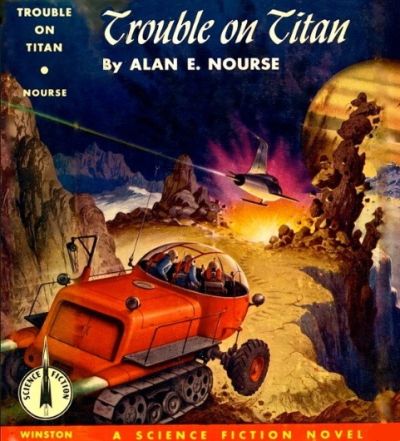Another Day Older And Deeper In Debt
Trouble on Titan
By Alan E. Nourse

3 Mar, 2019
Because My Tears Are Delicious To You
0 comments
1954’s Trouble on Titan was Alan E. Nourse’s debut novel1. It is standalone juvenile SF. It has recently been reprinted and issued in e‑book form by Prologue Books.
Tuck Benedict is disappointed to learn that his hoped-for reunion with his father must be postponed. Colonel Benedict has spent years troubleshooting on Mars and Venus for the Security Commission. His leave has been cancelled. He’s been dispatched to Titan, home to unruly rubidium miners.
The colonel invites Tuck to join him on his mission to Titan, but Tuck fears delay in reporting to college could cost him his scholarship. Then … luck puts Tuck in a position to save his father from a mail bomb. Afraid that the assassin might succeed if Tuck is not there to protect his father, Tuck changes his mind. School must wait until Tuck returns from the mining colony.
Titan used to be a prison colony. The discovery of an unusually rich source of rubidium ore dictated its conversion to a mining colony a century and a half ago. Although the last prisoner was shipped to Titan one hundred and fifty years ago, the community is still notorious across the Solar System for strikes and violence. It’s just too bad for the Solar System that the ungrateful workers control the main source of rubidium on which the solar power industry depends. Without solar power, the Earth itself might descend into the poverty of the atomic era.
The trip is uneventful, but no sooner does the Commission ship touch down than Anson Torm, the leader of the Titan mining colony, presents himself to the Colonel, claiming a crisis is at hand. The Colonel is suspicious; he knows for a fact that supplies have been going missing on Titan; for all he knows Torm himself is the culprit. A suspicion to some degree lulled when an assassin tries to kill both men.
Tuck discovers that he likes and even trusts Torm. This surprises him, as he has grown up thinking of the Titanians as criminal degenerates. He’s even more surprised when he makes unexpected friends with Torm’s hot-headed son David.
Tuck discovers that Titan is not as painted by the Commission. Incessant demands for better living conditions are a response to current living conditions (terrible). Titanians don’t move back to Earth because if they do, they face vicious prejudice. They don’t attend university because their applications are invariably denied. The colony’s reputation for violence is a myth fostered by the Commission, intended to justify exploitation of labour.
Not that some Titanians aren’t willing to be violent. John Cortell leads a cabal of workers determined to free Titan from Earth by wrecking the mines. It would seem that this bold plan would be death sentence for Titanians. What else but rubidium could they trade for essential supplies? But Cortell and his followers have a cunning plan. It’s a plan so secret that David has no idea what it could be. If David and Tuck are to prevent a bloody rebellion, they need to figure what Cortell plans and stop it. Or die trying.
~oOo~
Revisiting old books reveals forgotten details, like the fact that this setting borrowed Heinlein’s rolling roads. For that matter, solar power was an important aspect of Heinlein’s future history. As were one-sided labour relations, although Nourse takes an entirely different view from Heinlein’s “Oh, well. Historical inevitability, nothing to be done.”
The author’s introduction to the recent edition discusses what was known about Titan in the 1950s (not much). This gave him considerable leeway to create an interesting setting for his story. He couldn’t write the same novel now. He could write an even better one based on the world Titan turned out to be.
When I reviewed this uncounted eons ago on rec.arts.sf.written, I commented that it was difficult to reconcile the Colonel’s apparent status as a top agent with his short fuse and initial blindness to actual conditions on the colony. The only reason that the Colonel couldn’t re-enact the Amritsar massacre is that the ship that delivered him to Titan didn’t carry troops. One wonders just how he was solving all those other problems for the Commission.
The Commission could have ensured the Titanians’ loyalty to the system simply by treating the miners well. It wouldn’t have cost that much. Miners amount to a few hundred people in a civilization of billions. The Commission opted for repression. The Commission also declined to develop other rubidium mines, which means that terrestrial prosperity is dependent on a single facility whose staff the Commission has spent more than a century abusing. The Commission may be short-sighted idiots. Not unbelievably short-sighted idiots, mind you.
The novel ends on a hopeful note. Tuck and his father have learned the truth, the colonists have taken dramatic action, and finally, finally, the Commission must listen to the colonists’ complaints. But … the Commission has spent 150 years lying about conditions on Titan. What’s the chance that they’ll face up to their mistakes? To quote Upton Sinclair, “It is difficult to get a man to understand something, when his salary depends upon his not understanding it!”
This novel is a fair example of the art of the juvenile as it existed in the mid-1950s. The writing is inoffensively unambitious, the characterization is unchallenging, the plot straightforward; any women accidentally mentioned have no agency whatsoever. The book is notable only in that it took the side of the miners. John Campbell never would have published this Bolshevik nonsense. Astounding readers would have been outraged. Just as well that this was never serialized in Astounding. It was a Winston juvenile.
Trouble on Titan is available here (Amazon), here (Amazon), and here (Chapters-Indigo).
1: Nourse’s debut short story was 1951’s “High Threshold,” which was later incorporated into a fix-up,The Universe Between.
